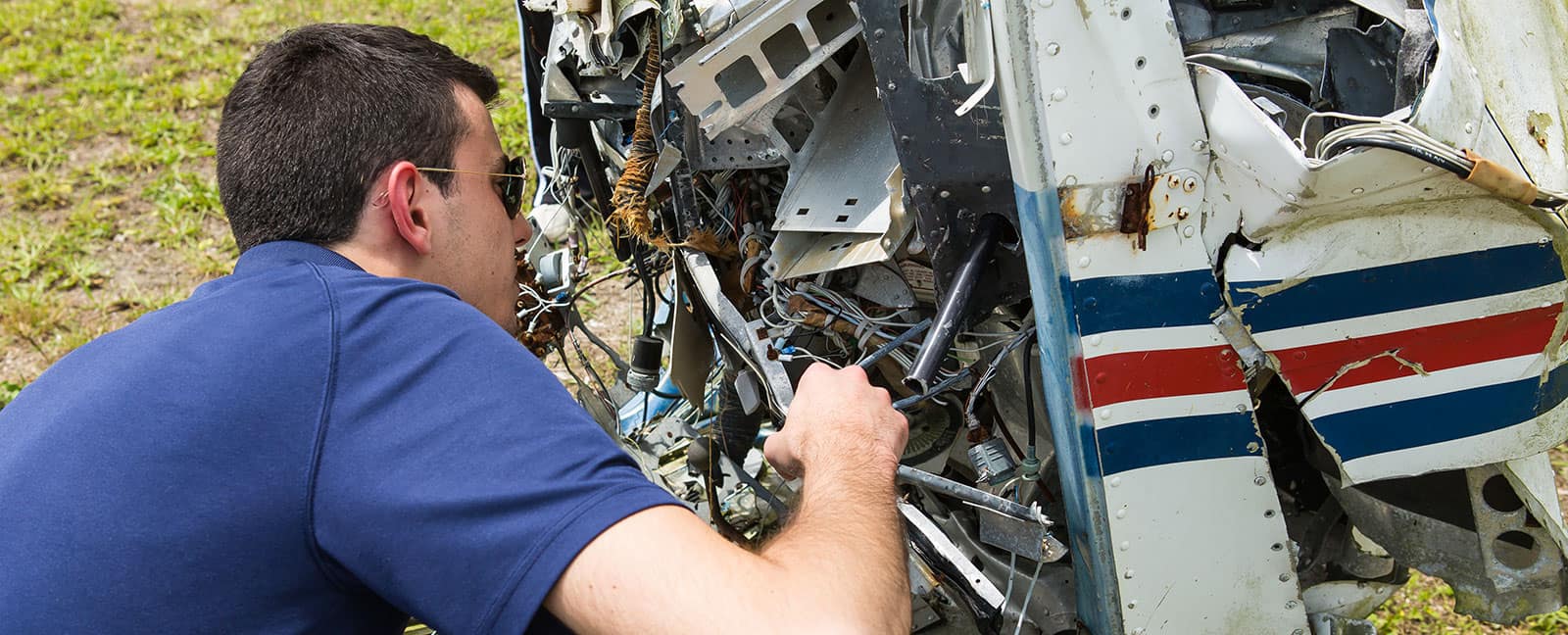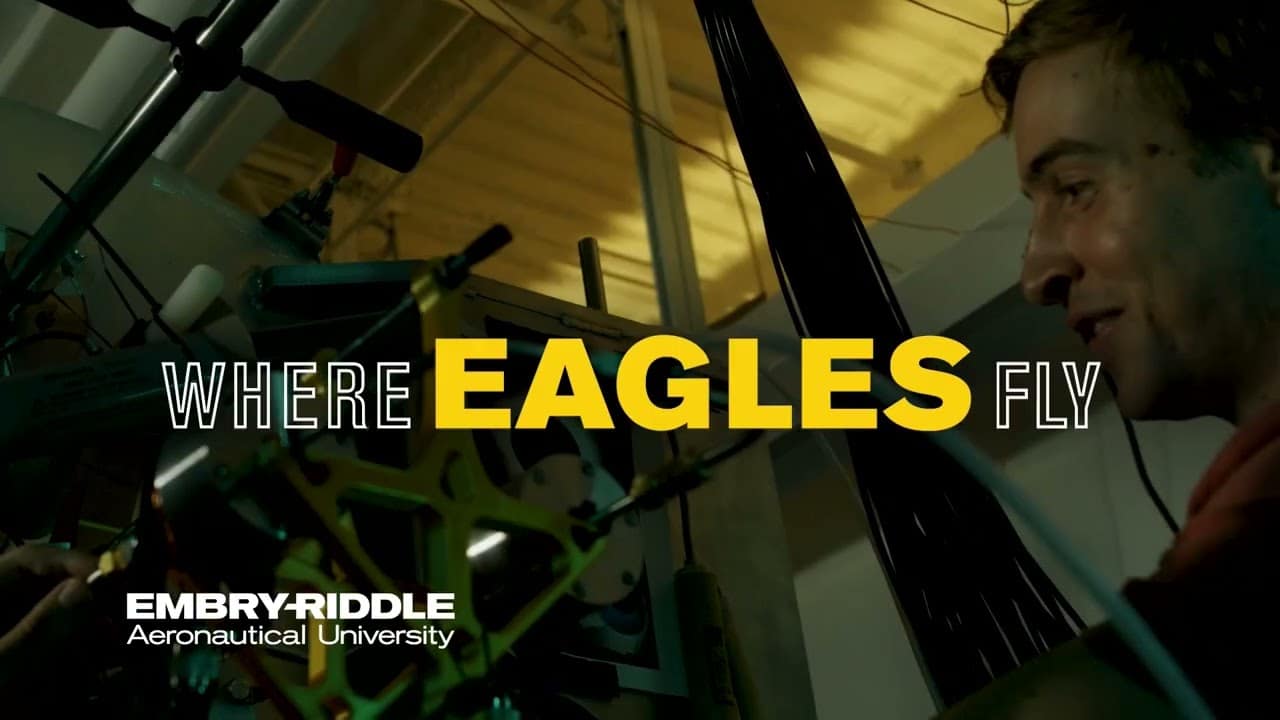
Bachelor of Science in
Aviation and Aerospace Safety
The B.S. in Aviation and Aerospace Safety teaches students to focus on safety as the foundation through unmatched learning experiences in the crash lab.
About the Bachelor of Science in Aviation and Aerospace Safety
The Bachelor of Science in Aviation and Aerospace Safety is designed for students passionate about safety. Graduates from this program are prepared for careers in aviation, manufacturing, construction, insurance, transportation, entertainment and government services.
At our program, you won’t just sit in classrooms. You’ll gain expertise in aerospace safety, following federal regulations and standards, and dive into hands-on experiences through internships and co-ops, tackling real-world safety challenges in places like our Aerospace Forensics Lab (Crash Lab). You’ll also have the chance to build your network and leadership skills by joining leading industry organizations as a student, such as the American Society of Safety Professionals and the International Society of Air Safety Investigators.
Why You Should Study This Degree
Aviation and Aerospace Safety involves studying aircraft and spacecraft, while focusing on preventing accidents and health issues. A degree focused on aerospace safety may be for you if you enjoy:
- Creative innovation in aircraft design.
- Ensuring safe work environments.
- Promoting worker health and safety.
- Working to prevent future safety issues by studying past occurrences.
Student Learning Outcomes
Aerospace safety opportunities you will have while pursuing an industrial safety degree:
- Identify, formulate and solve broadly defined technical or scientific problems by applying knowledge of topics in areas relevant to the discipline.
- Formulate or design a system, process, procedure or program to meet desired needs.
- Develop and conduct experiments or test hypotheses, analyze and interpret data and use scientific judgment to draw conclusions.
- Communicate effectively with a range of audiences.
- Understand ethical and professional responsibilities and the impact of technical and/or scientific solutions in global, economic, environmental and societal contexts.
- Function effectively on teams that establish goals, plan tasks, meet deadlines and analyze risk and uncertainty.
Aviation and Aerospace Safety Career Opportunities
Careers and Employers
Embry-Riddle Aviation and Aerospace Safety graduates are set to enter the workforce in areas such as:
- Airport Operations Coordinator
- Business Operations Program Manager
- Occupational Safety Specialist
- Safety Program Coordinator
- Spaceline Safety Specialist
AOS degree graduates tend to pursue higher education or enter the industry with organizations including:
- The Boeing Company
- Borneo Safety Training Services
- Empire Airlines
- Textron
- Virgin Galactic
Aviation and Aerospace Safety Salary Information
Graduates with a Bachelor of Science in Aviation and Aerospace Safety tend to receive competitive salaries, with an average income of $71,400 annually, as of 2022.
DETAILS
About Aviation and Aerospace Safety at the Daytona Beach, FL Campus
The coursework in the Bachelor of Science in Aviation and Aerospace Safety meets the Applied and Natural Science Commission (ANSAC) of ABET standards and general education requirements. Students will be prepared to provide safety and health expertise in various settings and technical guidance with regulatory compliance, industrial hygiene, human factors and workplace standards.
The program offers safety and health management courses, accident investigation, hazard recognition, risk assessment and occupational safety, preparing students to work in industrial safety settings.
Aviation and Aerospace Safety Information
- Credits: 122
- Online or In-Person: In-Person
Professional Accreditation
The program is preparing to seek accreditation by AABI (the Aviation Accreditation Board International). It meets BCSP Qualified Academic Program (QAP) standards and the graduates are awarded with the Graduate Safety Practitioner (GSP) designation. The GSP is a fast-track path toward the Certified Safety Professional (CSP) certification by waiving the need to sit for, and pass, the Associate Safety Professional (ASP) examination.
For students enrolled in the Bachelor of Science in Aerospace and Occupational Safety, that program remains accredited by the Applied and Natural Science Accreditation Commission of ABET, under the General Criteria and the Program Criteria for Environmental, Health, and Safety and Similarly Named Computing Programs as the program is officially taught out.
Helpful Links
- Tour our Daytona Beach Campus
- Discover the College's Faculty
- Explore the Fields of Study: Applied Science, Aviation, Space, and Security, Intelligence and Safety
- Find Related Clubs & Organizations
Student Learning Outcomes
Students will:
- Identify, formulate, and solve broadly defined technical or scientific problems by applying knowledge of mathematics and science and/or technical topics to areas relevant to the discipline.
- Formulate or design a system, process, procedure or program to meet desired needs.
- Develop and conduct experiments or test hypotheses, analyze and interpret data, and use scientific judgment to draw conclusions.
- Communicate effectively with a range of audiences.
- Understand ethical and professional responsibilities and the impact of technical and/or scientific solutions in global, economic, environmental, and societal contexts.
- Function effectively on teams that establish goals, plan tasks, meet deadlines, and analyze risk and uncertainty.
Degree Requirements
The Bachelor of Science degree in Aviation and Aerospace Safety requires successful completion of a minimum of 122 credit hours and is normally completed in eight semesters.
Students are required to complete 37 hours of General Education coursework, 67 hours of Core Safety Coursework, and 18 hours of Open Electives.
Students enrolled in the Air Force, Army, or Naval ROTC programs may substitute AF, MY, or NSC courses for open elective courses.
| General Education | 37 | |
| Aviation and Aerospace Safety Core | 67 | |
| Open Electives | 18 | |
| Total Credits | 122 | |
General Education Requirements
For a full description of Embry-Riddle General Education guidelines, please see the General Education section of this catalog. These minimum requirements are applicable to all degree programs.
| Communication Theory and Skills | 9 | |
| Lower-Level Humanities | 3 | |
| Lower-Level Social Sciences (EC 200) | 3 | |
| Lower-Level Humanities or Social Sciences (PSY 101) | 3 | |
| Upper-Level Humanities or Social Sciences * | 3 | |
| Computer Science | 3 | |
| Mathematics (MA 111, MA 112) | 6 | |
| Physical and Life Sciences PS 113 and (CHM 101, PS 117, BIO 120, BIO 142) | 6 | |
| Physical and Life Sciences Lab (CHM 101L, BIO 120L or PS 113L or PS 117L) | 1 | |
| Total Credits | 37 | |
Aviation and Aerospace Safety Core
| UNIV 101 | College Success | 1 |
| AS 254 | Aviation Legislation | 3 |
| BA 201 | Principles of Management | 3 |
| MA 210 | Introduction to Data Science | 3 |
| MA 222 | Business Statistics | 3 |
| SF 202 | Introduction to Safety Management Systems (SMS) | 3 |
| SF 204 | Aircraft Systems and Components for Air Safety | 3 |
| SF 210 | Introduction to Aerospace Safety | 3 |
| SF 309 | Aerodynamics and Performance for Air Safety | 3 |
| SF 312 | Safety Audit Techniques in Aviation | 3 |
| SF 314 | Sustainability and Environmental Safety Compliance | 3 |
| SF 320 | Human Factors in Aviation Safety | 3 |
| SF 330 | Aircraft Accident Investigation | 3 |
| SF 341 | Safety and Security of Airport Ground Operations | 3 |
| SF 345 | Safety Program Management | 3 |
| SF 350 | Aircraft Crash and Emergency Management | 3 |
| SF 355 | Industrial Hygiene and Toxicology | 3 |
| SF 401 | Fatigue Risk Management Systems | 3 |
| SF 410 | Occupational Safety and Health | 3 |
| SF 420 | Safety Data Analysis | 3 |
| SF 445 | System Safety and Risk Management | 3 |
| SF 455 | Aviation Safety Analytics | 3 |
| SF 475 | Senior Capstone Project | 3 |
OR Co-Op Ed Safety Science (CESF 396) | ||
| Total Credits | 67 | |
Open Electives
| Open Electives | 18 | |
| Total Degree Requirements | 122 | |
- *
The recommended elective is HU 330 Values and Ethics.
Suggested Plan of Study
Students should be aware that several courses in each academic year may have prerequisites and/or co-requisites. Please check the course descriptions at the back of this catalog before registering for classes to ensure requisite sequencing.
| Year One | ||
|---|---|---|
| Credits | ||
| UNIV 101 | College Success | 1 |
| COM 122 | English Composition | 3 |
| HU 14X Humanities Lower-Level Elective | 3 | |
| BA 201 | Principles of Management | 3 |
| MA 111 | Pre-Calculus for Aviation | 3 |
| MA 112 | Applied Calculus for Aviation | 3 |
| PS 113 | Introductory Physics I | 3 |
| CHM 101L | Basic Chemistry Laboratory | 1 |
or BIO 120L
|
Foundations of Biology I Laboratory | |
or PS 113L
|
Introductory Physics I Laboratory | |
or PS 117L
|
Introductory Physics II Lab | |
| PSY 101 | Introduction to Psychology | 3 |
| SF 202 | Introduction to Safety Management Systems (SMS) | 3 |
| SF 204 | Aircraft Systems and Components for Air Safety | 3 |
| SF 210 | Introduction to Aerospace Safety | 3 |
| Credits Subtotal | 32.0 | |
| Year Two | ||
| MA 210 | Introduction to Data Science | 3 |
| COM 219 | Speech | 3 |
| COM 221 | Technical Report Writing | 3 |
| EC 200 | An Economic Survey | 3 |
| CHM 101 | Basic Chemistry | 3 |
or BIO 120
|
Foundations of Biology I | |
or PS 117
|
Introductory Physics II | |
| MA 222 | Business Statistics | 3 |
| AS 254 | Aviation Legislation | 3 |
| SF 320 | Human Factors in Aviation Safety | 3 |
| SF 345 | Safety Program Management | 3 |
| SF 330 | Aircraft Accident Investigation | 3 |
| Credits Subtotal | 30.0 | |
| Year Three | ||
| HU/SS Upper-Level Elective | 3 | |
| SF 341 | Safety and Security of Airport Ground Operations | 3 |
| CS 120 | Introduction to Computing in Aviation | 3 |
| SF 355 | Industrial Hygiene and Toxicology | 3 |
| SF 350 | Aircraft Crash and Emergency Management | 3 |
| SF 314 | Sustainability and Environmental Safety Compliance | 3 |
| SF 309 | Aerodynamics and Performance for Air Safety | 3 |
| Open Electives | 9 | |
| Credits Subtotal | 30.0 | |
| Year Four | ||
| SF 455 | Aviation Safety Analytics | 3 |
| SF 420 | Safety Data Analysis | 3 |
| SF 445 | System Safety and Risk Management | 3 |
| SF 312 | Safety Audit Techniques in Aviation | 3 |
| SF 475 | Senior Capstone Project | 3 |
| Or CESF 396 Co-Op/Internship | ||
| SF 410 | Occupational Safety and Health | 3 |
| SF 401 | Fatigue Risk Management Systems | 3 |
| Open Electives | 9 | |
| Credits Subtotal | 30.0 | |
| Credits Total: | 122.0 | |
Get Started Now:
Summary
122 Credits
Estimate your tuition by using the Tuition Calculator
View Financial Aid Information
Learn about our General Education
Find out about transferring credits to this degree
Learn more about our Veterans & Military benefits
View our Academic Calendar




